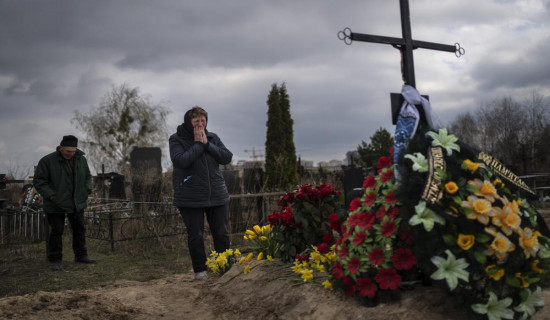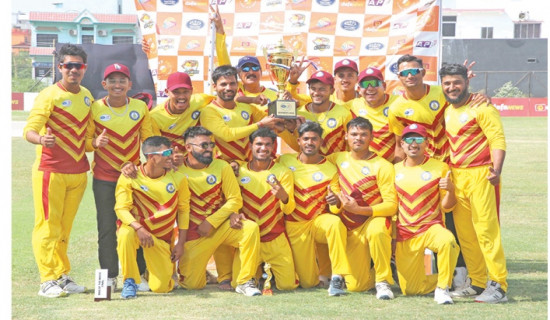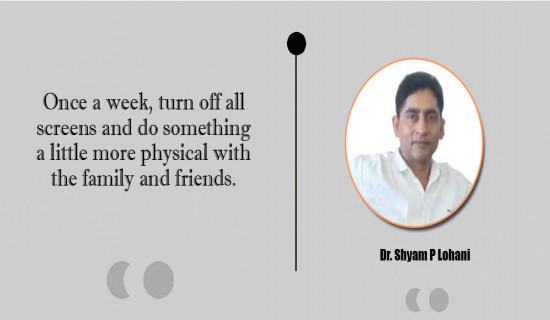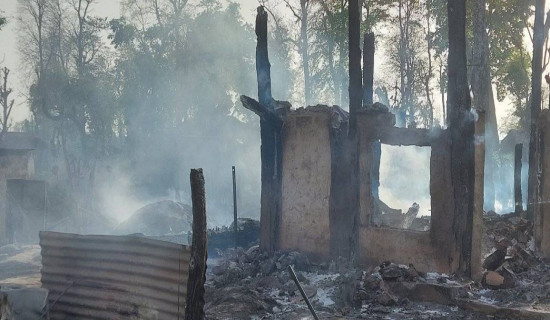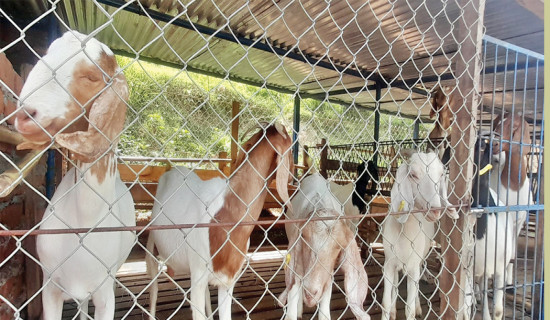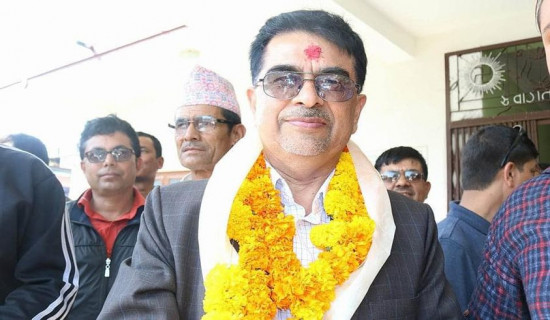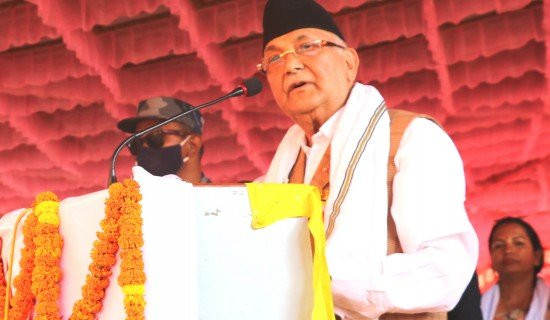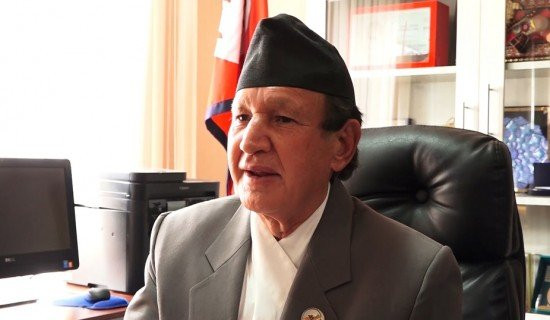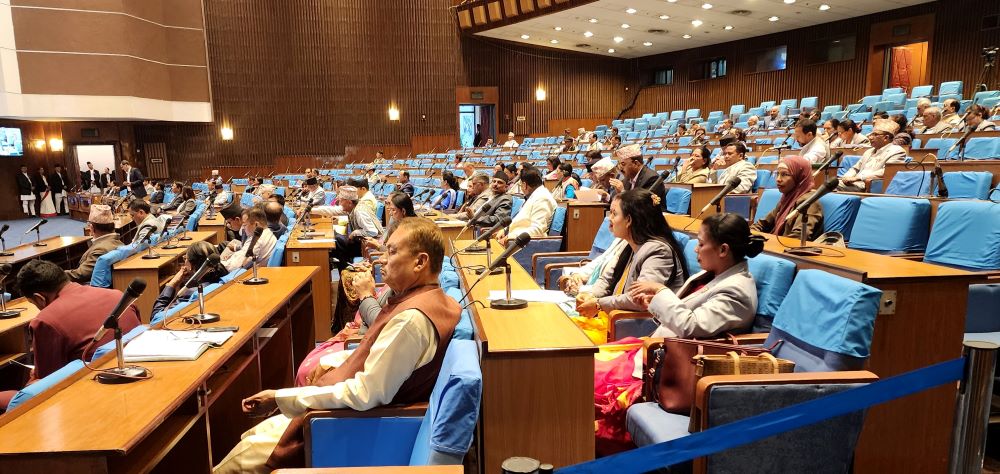- Wednesday, 3 September 2025
Russia renews strikes on Ukraine capital, hits other cities
By ADAM SCHRECK and MSTYSLAV CHERNOV , KYIV, Ukraine Apr 17 , (AP) — Russian forces accelerated scattered attacks on Kyiv, western Ukraine and beyond Saturday in an explosive reminder to Ukrainians and their Western supporters that the whole country remains under threat despite Moscow’s pivot toward mounting a new offensive in the east.Stung by the loss of its Black Sea flagship and indignant over alleged Ukrainian aggression on Russian territory, Russia’s military command had warned of renewed missile strikes on Ukraine’s capital. Officials in Moscow said they were targeting military sites, a claim repeated — and refuted by witnesses — throughout 52 days of war.The toll reaches much deeper. Each day brings new discoveries of civilian victims of an invasion that has shattered European security. As Russia prepared for the anticipated offensive, a mother wept over her 15-year-old son’s body after rockets hit a residential area of Kharkiv, a city in northeast Ukraine. An infant and at least eight other people died, officials said.In the towns and villages just outside Kyiv, authorities have reported finding the bodies of more than 900 civilians, most shot dead, since Russian troops retreated two weeks ago. Smoke rose from the capital again early Saturday as Mayor Vitali Klitschko reported a strike that killed one person and wounded several.The mayor advised residents who fled the city earlier in the war not to return.“We’re not ruling out further strikes on the capital,” Klitschko said. “If you have the opportunity to stay a little bit longer in the cities where it’s safer, do it.”It was not immediately clear from the ground what was hit in the strike on Kyiv’s Darnytskyi district. The sprawling area on the southeastern edge of the capital contains a mixture of Soviet-style apartment blocks, newer shopping centers and big-box retail outlets, industrial areas and railyards.Russian Defense Ministry spokesman Igor Konashenkov said an armored vehicle plant was targeted. He didn’t specify where the factory was located, but there is one in the Darnytskyi district.He said the plant was among multiple Ukrainian military sites hit with “air-launched high-precision long-range weapons.” As the U.S. and Europe send new arms to Ukraine, the strategy could be aimed at hobbling Ukraine’s defenses ahead of what’s expected to be a full-scale Russian assault in the east.It was the second strike in the Kyiv area since the Russian military vowed this week to step up missile strikes on the capital. Another hit a missile plant Friday.The Russian missiles hit the city just as residents were emerging for walks, foreign embassies planned to reopen and other tentative signs of the city’s prewar life started resurfacing, following the failure of Russian troops to capture Kyiv and their withdrawal.Kyiv was one of many targets Saturday. The Ukrainian president’s office reported missile strikes and shelling over the past 24 hours in eight regions across the country.The governor of the Lviv region in western Ukraine, which has been only sporadically touched by the war’s violence, reported airstrikes on the region by Russian Su-35 aircraft that took off from neighboring Belarus.In apparent preparations for its assault on the east, the Russian military has intensified shelling of Kharkiv, Ukraine’s second-largest city, in recent days. Friday’s attack killed civilians and wounded more than 50 people, the Ukrainian president’s office reported.On Saturday an explosion believed to be caused by a missile sent emergency workers scrambling near an outdoor market in Kharkiv, according to AP journalists at the scene. One person was killed, and at least 18 people were wounded, according to rescue workers.“All the windows, all the furniture, all destroyed. And the door, too,” recounted stunned resident Valentina Ulianova.Kharkiv Mayor Ihor Terekhov said Saturday’s toll was three dead and 34 wounded.Nate Mook, a member of the World Central Kitchen NGO run by celebrity chef José Andrés, said in a tweet that four workers in Kharkiv were wounded by a strike. José Andrés tweeted that staff members were unnerved but safe.Austrian Chancellor Karl Nehammer, who met with Vladimir Putin this past week in Moscow — the first European leader to do so since the invasion began Feb. 24 — said the Russian president is “in his own war logic” on Ukraine.In an interview on NBC’s “Meet the Press,” Nehammer said he thinks Putin believes he is winning the war and “we have to look in his eyes and we have to confront him with that, what we see in Ukraine.”Nehammer said he confronted Putin with what he saw during a visit to the Kyiv suburb of Bucha, where more than 350 bodies have been found along with evidence of killings and torture under Russian occupation, and “it was not a friendly conversation.”Ukrainian President Volodymyr Zelenskyy said in an interview with Ukrainian journalists that the continuing siege of the port city of Mariupol, which has come at a horrific cost to trapped and starving civilians, could scuttle attempts to negotiate an end to the war.“The destruction of all our guys in Mariupol — what they are doing now — can put an end to any format of negotiations,” he said.Later, in his nightly video address to the nation, Zelenskyy said Ukraine needs more support from the West to have a chance at saving Mariupol.“Either our partners give Ukraine all of the necessary heavy weapons, the planes, and without exaggeration immediately, so we can reduce the pressure of the occupiers on Mariupol and break the blockade,” he said, “or we do so through negotiations, in which the role of our partners should be decisive.”Zelenskyy said the situation in Mariupol remains “inhuman” and Russia “is deliberately trying to destroy everyone who is there.”Russian Defense Ministry spokesman Igor Konashenkov said Saturday that Ukrainian forces had been driven out of most of the city and remained only in the huge Azovstal steel mill.Capturing Mariupol would allow Russian forces in the south, which came up through the annexed Crimean Peninsula, to fully link up with troops in the Donbas region, Ukraine’s eastern industrial heartland.Zelenskyy estimated that 2,500 to 3,000 Ukrainian troops have died in the war, and about 10,000 have been wounded. The office of Ukraine’s prosecutor general said Saturday that at least 200 children have been killed, and more than 360 wounded.Russian forces also have taken captive some 700 Ukrainian troops and more than 1,000 civilians, Ukrainian Deputy Prime Minister Iryna Vereshchuk said Saturday. Ukraine holds about the same number of Russian troops as prisoners and intends to arrange a swap but is demanding the release of civilians “without any conditions,” she said.Russia’s warning of stepped-up attacks on Kyiv came after it accused Ukraine on Thursday of wounding seven people and damaging about 100 residential buildings with airstrikes in Bryansk, a region bordering Ukraine. Ukrainian officials have not confirmed hitting targets in Russia.Russian Maj. Gen. Vladimir Frolov, whose troops have been among those besieging Mariupol, was buried Saturday in St. Petersburg after dying in battle, Gov. Alexander Beglov said. Ukraine has said several Russian generals and dozens of other high-ranking officers have been killed in the war.In the Vatican, Pope Francis on Saturday invoked “gestures of peace in these days marked by the horror of war” in an Easter vigil homily at St. Peter’s Basilica that was attended by the mayor of the occupied Ukrainian city of Melitopol and three members of Ukraine’s parliament. Francis did not refer directly to Russia’s invasion but has called, apparently in vain, for an Easter truce to reach a negotiated peace.
Rupandehi clinches Nepal Pro Club Championship title
By A Staff ReporterKathmandu, Apr 17 : Rupandehi XI clinched the title of Nepal Pro Club Championship after they registered a seven wickets victory over Malaysia XI held at Siddharthanagar, Bhairahawa on Saturday.Prajjwol Thapa completed an individual half-ton as host Rupandehi XI chased the target of 141 runs set by visitors Malaysia XI in the 19 overs with the loss of just three wickets in the 20 overs allocated match.The player of the match and Opener Prajjwol Thapa scored the highest 71 runs off 61 balls that included eight boundaries and two sixes while Sandeep Rajali scored 41 runs off 45 balls that included four boundaries and a single six and opener Dev Khanal contributed 12 runs to kiss the title. He contributed 12 runs off 5 balls that included a single six and a boundary.Muhammad Wafiq, Syed Aziz, and Sharvin Muniandy grabbed one wicket apiece for the victim Malaysian team in the title clash. All-rounder Basir Ahamad was declared the Player of the Series for his all-rounder performance in the tournament. Ahamad scored 119 runs and claimed 10 wickets in the tournament to kiss the Player of the Series. Earlier, host Rupandehi won the toss and invited visitors Malaysian team and they scored 140 runs with the loss of six wickets in the allocated 20 overs match. The middle-order Nazril Rahman scored the highest 36 runs off 22 balls that included four boundaries and two sixes while opener Zubaidi Zulkifle hit 26 runs off 16 balls that included four boundaries and a six and Syed Aziz scored 20 runs off 27 balls that included two boundaries.
Healthy Living Lengthens Lifespan
Dr. Shyam P Lohani, A healthy lifestyle basically means doing things that make us happy and feel good. A healthy lifestyle is vital for everyone to maintain a healthy living. We feel better physically, socially, mentally, as well as spiritually living healthily. Healthy living not only helps in saving money but is also associated with fewer health problems. It means we are in control of our life. Healthy living is different for different people. It might be walking a mile five times a week and spending virtual or in-person with friends or loved ones frequently for someone and for others, a healthy lifestyle may be heavy workouts in a gym, following a vegan diet, and never smoking.EssentialsA healthy lifestyle does not warrant drastic changes in our life. We may adapt to change better when it does not require us to overhaul our entire life. It is advised to begin with one thing and work on that every day, keeping the rest of our life and habits stay the same. Healthy habits can reduce the risk of various diseases, including those that have traditionally been seen in the family. Those diseases include but are not limited to cardiovascular diseases, diabetes, and other non-communicable ones. Good health is not just the absence of disease or illness but is a state of complete physical, mental, spiritual, and social well-being. People, who are non-smokers, try to maintain a healthy weight, eat healthy foods with plenty of fruits, vegetables, and fiber, and, of course, exercise on a regular basis are considered healthy. Healthy living helps us to manage stress, get good quality sleep each night, don't drink too much, don't sit too much, and basically, do everything in moderation all the time. Eating a balanced diet, getting regular exercise, avoiding tobacco and drugs, and getting plenty of rest are the key healthy living habits.It is important to know that physical fitness is not the sole basis of being healthy. Being healthy means being mentally, emotionally, and socially fit. Remaining healthy should be part of our overall lifestyle. There is evidence that maintaining a healthy lifestyle can help prevent chronic diseases and long-term illnesses. For our self-esteem and self-image, it is imperative to have good feelings about ourselves and take care of our overall health. Therefore, it is vital to maintain a healthy lifestyle by doing what is right for the body. As part of healthy living, exercise plays a crucial role. It is advised to exercise at least 20-30 minutes a day five times a week. It is noteworthy to monitor whether we have enough physical activity each day.Even in normal circumstances, strong relationships and staying in tune with friends and loved ones can support mental health. Looking at the brighter side of life helps us maintain mental health. Even if we find ourselves in the worst situation, there is always an upside to it something good and positive, therefore focus on the better aspects rather. It is neither difficult nor does it require a lot of work to maintain a healthy lifestyle. There are a few good habits such as consuming more vegetables and fruits, which are associated with a lower risk of heart disease, stroke, cancer, and premature death.A balanced diet has several benefits such as a strong immune system to prevent and fight infections. It has been found that a balanced diet lowers the risk of certain types of cancers; lower blood pressure; a healthy weight; more energy; essential nutrients to support tissue growth. There is strong evidence to avoid ultra-processed as well as convenience foods. In order to change the texture, taste, or color, ultra-processed foods utilize techniques to refine grains and add additives. Foods such as cheese puffs, packaged dessert cakes, chicken nuggets, and sweetened breakfast cereals are a few examples of ultra-processed foods.Moreover, convenience food also has a negative impact on our health. Those foods include junk foods like crisps and chocolate, which are high in calories but low in nutritional value; fast food, such as hamburgers and fried chicken. They are usually prepared and served quickly but are high in fat; convenience food such as microwave-ready meals, often has too much salt and sugar added to it.Scheduling timeChronic stress is said to cause many diseases. It takes a toll on our immune system and makes us more susceptible to health problems, including heart disease, diabetes, digestive problems, depression, high blood pressure, anxiety, and difficulty sleeping. Exercise can help reduce stress. Physical activity can also help boost the release of mood-lifting hormones called endorphins. Mindfulness practices such as meditation, deep breathing, journaling, or spending time in nature can help to lower stress, and so does talking to friends.The recent lockdown has added extra time for watching TV and working on computers. It is suggested to make a schedule of when to turn off the TV and computer. Once a week, turn off all screens and do something a little more physical with the family and friends. Thus, let us give some time to play games, take a walk, and do almost anything that will be more active than sitting on the couch and watching even your favorite programs.(Dr. Lohani is the clinical director at the Nepal Drug and Poison Information Centre. lohanis@gmail.com)
Strangle performs live at Svana Studio Sessions
By Mannu ShahiStrangle is a tightly knitted hardcore quartet hailing from Lalitpur, that has been actively making music in the Nepali DIY scene for over a decade. Comprising of Ashish Kayastha on guitars, Dipesh Joshi on drums, Bibek Tamang on bass, and Santosh Shrestha on vocals, the initial line-up of the group assembled for the first time in 2009 and played live in rather eccentric places like Lukla, Namche, and Khumjung the same year.Starting out as a thrash metal outfit, the group, with time, shifted towards hardcore/crossover thrash to record an eight-track demo album in 2012. Strangle has published two full-length albums ‘You’re Next In Line’ (2017), ‘Nation Failed’ (2020), and an EP ‘The Illusion’ (2018) under their belt.Ashish Kayastha is the only remaining founding member who has managed to help sustain the group over time. In 2009, the guitarist teamed up with his friends Utsav Thapa on vocals, Avinash Magar on drums, and Ramesh Sunar on bass to give life to the very first edition of the band. Avinash, the drummer, was the one to pin the name Strangle after one of their original tunes “Strangle in Pain”. However, by 2011 the members all deserted away in their personal responsibilities and the band was not very active for a certain time until 2012 when Vikrant Singh Thapa replaced Avinash on drums and swapped the vocal duties in place of Utsav.This edition of the group was playing shows and vibrantly participating in music-making until 2014 when three members, including Ashish, had to leave the country for higher education. Thus, for two more years the band went on a hiatus without the nucleus ally of this unit, who returned to Nepal in 2016 to form yet another version of Strangle consisting of Amrit Bhandari on vocals, Bibek Tamang on bass, Ashish Kayastha on guitars and Dipesh Gurung of The Elements/The Kathmandu Killer helping out with the drums till the return of the former drummer Vikrant Singh Thapa.This formation of the group recorded the first album together but sadly Bikrant left due to some personal reasons and came in Dipesh Joshi, the current drummer of the band. Soon after Strangle were offered a touring gig in Indonesia along with another crust punk group The Doltish in 2020. The two bands traveled for a 15-day tour in five cities of Indonesia including Jakarta, Bandung, Sukabumi, Malang and Bali as well as played in a grand punk festival called Libertad Fest. While their plans were for a shorter stay, both the groups were stuck in Indonesia for 4 months straight due to the COVID-19 pandemic. Without proper resources and planning their elongated stay came off as a rather scary and uncertain experience. Although the members look back and cherish those moments now as a period of strengthening their friendship and compassion for one another. Also, during the same time the group published their second full-length album via Bandcamp and their official YouTube handle.After returning back, sadly vocalist Amrit left the group and Santosh Shrestha, the present vocalist, stepped in as the front person for the outfit. Although the group has seen quite a shift of members in the line-up, nonetheless, all of their past friends are still part of the Strangle family and help out in whatever way possible to keep the band moving forward. Since the band is a community-driven cluster its objectives are concerned in the overall upliftment of the underground music scene. Thus, organizing their own shows, bringing in their own gears, helping other bands, and creating an inclusive scene are among some ethical actions Strangle is popular for. And recently, the band was featured in the Svana Studio’s Live Sessions Series Season 2. Svana, an emerging live recording studio in Lalitpur, has been hosting sessions with various rock, punk, and metal bands to bring forth live recorded material for a wider demographic. Released on April 9, 2022, Strangle performed six tunes from the second album ‘Nation Failed’, their socio-politically driven lyrics perfectly complementing the angsty music. Santosh’s growls and screams augment the rage of youths with the political malfunctions in our country. Ashish welds things together with killer riffs and finely crafted structures. Bibek equilibrize the lower end and supports the synchronization throughout and Dipesh blasts some top-notch drumming raising the energy level even higher. So do check out the video via the official Svana Studio channel and support the band further by discovering them on their social handles for more exciting news that the band plans in the future.
Fire destroys 11 houses in Rapti-Sonari
By Siraj KhanBanke, Apr 17 : A fire broke out from the house of Sitaram Jaisi at Tikalipur Village in Ward No. 2, in Rapti-Sonari Rural Municipality, Banke district, on the afternoon of April 15. According to Dhakeri Police Station in-charge of Tek Bahadur KC, they had called fire engines from Kohalpur and Nepalgunj to extinguish the fire. However, until the fire engines from Nepalgunj and Kohalpur arrived in the village, the fire spread and destroyed a total of 11 houses and four sheds.“The weather was windy due to which the fire expanded to other structures. There is no fire engine at Rapti-Sonari because of which the fire couldn’t be controlled early,” said Deputy Superintendent of Police (DSP) Ain Bahadur Malla, chief of Kohalpur Area Police Office.The rural municipality has decided to provide a compensation of Rs. 150,000 to all the families as a support for building new houses. Banke District Disaster Management Committee has also pledged to compensate the victims.Meanwhile, locals argued that they wouldn’t have to be compensated repeatedly if the rural municipality had its own fire engine.“We have no option but to wait for the fire to spread and cause significant damage until the fire engine arrives from Nepalgunj or Kohalpur. Because the fire engine has to come from far, the properties are reduced to ashes in front of our eyes before they reach the village,” said Janak Tharu, a local of Rapti-Sonari.During the summer season, fire incidents are a common occurrences across Banke’s eastern region – Rapti-Sonari and Narainapur. These two rural municipalities are far from Nepalgunj and Kohalpur, the reason why fire engines reach take time to reach there. Narainapur Rural Municipality had recently procured a fire engine after continuous pressure from the locals. “After the fire engine was bought, it has been easy to put out fire incidents and prevent widespread damage. Earlier, several properties turned to ashes as the fire engines couldn’t arrive in time,” said Istiyak Ahamad Sah, chairman of the municipality.Meanwhile, locals of Rapti-Sonari continue to wait for a fire engine as it doesn’t fall under the municipality’s priority in the officials’ five-year tenure.“The municipality spent budgets under different sectors but didn’t prioritize fire incidents, a recurring major disaster at the local level,” said Tharu, a local.
Extreme heat affects daily life in Terai
By Our CorrespondentSarlahi, Apr `17 : Due to the extreme heat, people's lives in the Terai districts including Sarlahi has been severely affected.Residents of Terai Madhes have experienced extreme heat due to hot winds as a result of recurrent sunny days. The temperature in the Terai region has increased day by day.The maximum temperature in Sarlahi was recorded 39 degrees Celsius at noon on Friday. People have difficulty in getting out of the house at day time due to extreme heat. The activities of people in the markets of the district like Lalbandi, Hariwan, Bayalbas, Barhathwa, and Malangwa have decreased a lot. Locals in the rural areas of the district have been further affected by the dust blowing in the foggy summer.Surging heat has led to an increase in the number of heat-related illnesses in health facilities. Dr. Guneshwor Jha, a resident of headquarters Malangwa, has urged the people not to go out except for urgent work as it is getting intolerable due to hot air which has a serious impact on health.He urged to take more care of children and the elderly as pollution has increased. Dr. Jha has suggested eating enough foods that give coolness to the body like cold liquid, cucumber, melon, pulses, and cereals.
Tanahun woman earning Rs. 50,000 per month from goat rearing
BY AMAR RAJ NAHARKITanahun, Apr 17 : A woman from Tanahun has been able to earn both name and money from goat rearing in the village.Gayatri Pudasaini Adhikari has earned both name and money by operating a goat farm in Churekholsi of Vyas Municipality-4, Tanahun.She has been increasing her investment since she started earning good income from goat farming.According to Adhikari, she is earning around Rs. 50,000 monthly from the business.Adhikari, who has already invested Rs. 5 million, plans to invest an additional Rs. 4.1 million within the current fiscal year to earn a monthly profit of Rs. 200,000.A total of 90 Boer goats, including 43 nannies, 23 kids are in her Ganga Devi Goat Farm, she said.She has been rearing goats in around 36 companies of land, including 24 companies of her own land and 12 companies of rented land.Napier, Super Napier, Smart Napier, Stylo, Bashar, Rayokhanayo, Kimbu, and other varieties of grass have been planted.She informed that out of 36 companies, two companies have structure and the rest have grass cultivation.Husband Narayan Adhikari, father-in-law Devi Prasad Adhikari and mother-in-law Gangadevi Adhikari have assisted her in goat rearing.Adhikari said that four locals along with her family are employed in the farm.She said that she came up with the idea of rearing goats in the village after finding out that the country has been forced to import goats from India due to high demand for meat."We decided to rear Boer goats commercially as it would help stop the outflow of money to import goats to meet the local demand," Adhikari said.She said that she initially bought Boer Billy goat at a cost of Rs. 300,000, including transportation, from Australia.She said that she has reared Boer goats commercially by purchasing pure Boer goat kids from Bandipur Goat Research Centre and National Animal Breeding Center, Pokhara.Adhikari said that she started to rear Boer goats by removing local goats as it would be sold at a higher price and there would be more profit soon.Gayatri has succeeded in setting an example that one can earn income from agriculture by inspiring others to rear goats of advanced breeds, said Bishwo Raj Neupane, ward chairman of Vyas Municipality-4.Adhikari's farm is currently focused on producing improved breeds of kids rather than goats for meat.Rudrasen Thakuri, a technician at the Veterinary Hospital and Veterinary Expert Center, Tanahun, said that she was successful in getting a grant of Rs. 200,000. Gayatri Adhikari said that she was excited when her firm was listed to receive an Rs. 2.05 million grant from Nepal Livestock Sector Innovation Project, Pokhara.She said that work was being done in the current fiscal year as per the provision of investing the same amount as the grant received.The government should provide subsidies to the farmers to increase production of maize and other agro crops as they have to be imported from abroad, she said.
Securities worth Rs. 143.58 billion listed at NEPSE in eight months FY 2021/22
BY A STAFF REPORTERKathmandu, Apr 17 : Securities worth Rs. 143.58 billion were listed at Nepal Stock Exchange (NEPSE) during the eight months of the current fiscal year 2021/22. Such securities comprise debenture worth Rs. 46.16 billion, bonus shares worth Rs. 37.16 billion, government bond worth Rs. 29.50 billion, the ordinary share worth Rs. 17.83 billion, right share worth Rs. 9.18 billion and a mutual fund worth Rs. 3.75 billion, according to the macroeconomic report of Nepal Rastra Bank (NRB). Securities Board of Nepal (SEBON) approved the total public issuance of securities worth Rs. 13.75 billion during the review period.The SEBON has given permission to the concerned companies to issue debenture worth Rs. 4.8 billion, right share worth Rs. 3.11 billion, mutual fund worth Rs. 3.0 billion and ordinary shares worth Rs. 2.84 billion in the review period. The share of BFIs and insurance companies in stock market capitalization is 66 percent. Such a share for hydropower companies is 10.6 percent, investment companies 7.1 percent, manufacturing and processing industries 4.1 percent, hotels 1.4 percent, trading companies 0.4 percent, and the share of other companies is 10.3 percent.The paid-up value of 6.61 billion shares listed at NEPSE stood at Rs. 651.21 billion in mid-March 2022.The number of companies listed at NEPSE reached 228 in mid-March 2022, out of which 144 are Bank and Financial Institutions (BFIs) and insurance companies, 47 hydropower companies, 19 manufacturing and processing industries, 6 investment companies, 5 hotels, 4 trading companies, and 3 others. The number of companies listed at NEPSE was 217 in mid-March 2021.
Push For Economic Transformation
Economic transformation has been one of the much-talked-about issues before and after various political changes Nepal has gone through. But achieving economic transformation has not been possible owing to a lack of strong political will and commitment. Economic transformation involves moving labor from low to higher productive activities in the sector they are involved in. For a country like Nepal where the majority of the population has been engaged in subsistence agriculture, the process of economic transformation requires to begin with modernization and commercialization of agriculture to increase production and productivity. This helps reduce dependency on agriculture by shifting the excess population to agro-based industries and other potential service and manufacturing sectors.It is worrying that despite being an agricultural nation, Nepal has been importing agricultural products worth billions of rupees annually. In the fiscal year 2020/21, the country imported rice grains alone worth Rs. 50 billion. In the past, the nation used to export food items, including rice. The import value of live animals and meat items is equally higher. This shows that the import of agro-based products which we can easily produce in the country is alarmingly driving a deficit of trade and balance of payment. Realizing the fact, Finance Minister Janardan Sharma has said that the Nepali economy needs urgent transformation, mostly in agriculture and state mechanisms. According to him, revolutionary changes are needed to transform the agriculture sector in order to make it able to substitute imports that have reached Rs. 300 billion a year. The country’s foreign currency reserves are also facing a lot of pressure as it is importing even those goods that could be grown here. Sharma, who has initiated budget-related discussions, believes that the national economy could be strengthened by taking different measures such as development in agriculture, reduction in imports of petroleum products, increase in the generation and consumption of hydroelectricity and tourism. The government is planning to reduce the consumption of fossil fuels by 20 percent and shift the subsidy given to LP gas to the electric cooking appliances to substitute import of the cooking gas. The Nepal Oil Corporation is currently supplying the LP gas to consumers bearing a loss of Rs. 932 per cylinder. As the country is facing a balance of payment deficit and depletion in foreign reserves posing a threat to aggravating the economic crisis, it is urgent to intensify the process of economic transformation. The agriculture sector should be accorded the topmost priority which could lead to the transformation of other sectors gradually. For the transformation of subsistence agriculture into a modern and commercial one, and also to help industrial development, the government and the political parties should step up monumental measures in regard to the utilization of land and ownership patterns. Agricultural transformation and productivity enhancement is not possible under the current landholding and utilization form. Therefore, the political parties and the government bring about revolutionary changes in it without calculating any political gains and losses. In addition, the government should also focus on modernization and mechanization of agriculture and managing quality agro-services and inputs. Attracting youths into agriculture and advancing this as a decent profession in the perception of society is essential.
A New Age Of Party Democracy
Emilija T. Gjorgjievska , The results of the first round of the French presidential election have echoed the late Peter Mair’s ground-breaking claim, published in 2013, that the ‘age of party democracy has passed. The expert on European politics did not assume that parties would disappear—rather new parties or movements would arise in contemporary democracies, such as we have witnessed with La République En Marche (LRM), the Five Star Movement in Italy or the Pirates and ANO in the Czech Republic. A common thread is what Mair called the ‘hollowing’ of democracy, reflected in a void of disengagement between citizens and their states.The latest electoral result adds to this worrying trend. France’s two long-dominant center-right and center-left parties, Les Républicains (in the most recent incarnation) and Le Parti Socialiste respectively, traded power for most of the six decades and more since the ‘fifth republic’ was established, have collapsed. Between them, they won only 2.3 million out of more than 35 million votes cast.TechnopopulismBut much longer-term societal and political transformations, as elaborated by Christopher Bickerton and Carlo Invernizzi Accetti, have led to a new way of doing politics—‘tech populism’. The fragmentation of contemporary societies makes it very convenient for party leaders to build electoral strategies by staking a claim to expertise, as with Emmanuel Macron using LRM as his vehicle, or by appealing to ‘the people, as with Marine La Pen and her Rassemblement National—the candidates left standing to contest the second round. Indeed, in the logic of tech populism, the two pitches are combined.What should prevent the detachment of individual citizens from their societies are political parties which serve citizens and build social trust, rendering concrete abstract notions of the state, civil society, and their interrelationship. Starting within their own organizations, parties demystify the notion of political accountability. In the absence of structured party democracy, with strong intermediary bodies and a requirement of account-giving, contemporary political leaders who morph into governmental elites can just keep doing ‘whatever it takes to gain and regain power.Dominant political leaders are operating self-referential rules, ostensibly justified by the technical exigencies of effectiveness, modernization, and fast adaptation to external demands, all in the service of ‘the people’. Macron is forever inventing new ways to do European or national politics, whether by reliance on purportedly neutral external expertise—in his administration’s frequent resort to consultancy from McKinsey & Co—or in his transformation of the traditional civil service, replacing the National School of Administration (ENA) with a new Institute of Public Service (ISP) whose graduates’ skills could be put at the service of the private sector as well.This recalls in many ways the approach advanced in the United Kingdom by the former prime-ministerial adviser Dominic Cummings. A managerial, ‘business’ logic seeks to mitigate risks and avoid conflicts, rather than accept public scrutiny or challenge by the political opposition. Indeed a ‘beyond left and right’ bypass of party value systems would be preferred, without recognizing the significance of political alternation.This very much echoes how Mark Rutte won (again) last year’s election in the Netherlands, adopting an ostensibly pragmatic and non-ideological approach that has won him favorable comparisons with the former German chancellor, Angela Merkel. It is a way of doing politics that absorbs rivals on the left, rather than engaging in political contests, leading to a ‘normalization’ of policies for which his own center-right party would not normally stand.The logic of tech populism, whether via the elevation of technical expertise to the political level or the appeal from there to ‘the people’ as if this were free of ideology, leaves an empty space in politics in which leaders no longer accountable to parties can design and run political competitions based on their own beliefs and competences, which can quickly be adapted to a changing environment. Le Pen’s new focus on le pouvoir d’achat (the cost-of-living crisis) in her 2022 campaign, rather than on identity and immigration as in 2017, follows this logic. Alienation Feeding this logic of doing politics, however, has its consequences. One is further alienation among citizens, reflected in abstention from voting and indicators of gradual erosion of social trust. While self-empowerment is evident in the form of social movements, protests and so on, the collective empowerment in which political parties should have the central role is simplified to electoral cycles and strategies in which citizens remain disengaged. Rather than articulate their own collective choices, they are stuck with the choices the political leaders have already made for them.This risk to contemporary democracies requires reinventing the role of party organizations and a new impetus for collective actions which would reflect the needs of societies and their citizens. Such party democracy would assume that political leaders are recruited from within and are held to account by the party itself, including by its base in its members. The logic of account-giving would require parties once more to translate such abstractions as the rule of law or the common good into concrete, intermediated spaces in modern political systems operating at the service of the citizens.(The author is a lecturer in contemporary European politics at Charles University in Prague.)
Promote Value System
Parmeshwar DevkotaAs the local election is nearing, political parties are intensifying their activities nationwide. They are busy holding closed-door parleys to pick the candidates recommended by the lower committees. At the same time, the parties have also formed strategic alliances to gain more votes. This has naturally impelled the foot soldiers to launch a door-to-door campaign to woo the hearts of electorates, thereby setting the tempo for the May 13 local elections.The poll fervour has gripped both rural and urban constituencies. Local intelligentsia, teachers, labourers and farmers are assessing the past activities of the parties. The common voters seem to be making up their minds to shift their political allegiance.A person vying for the ticket of ward chairman in a municipality on the outskirts of the Kathmandu Valley admitted that if his party picked him as the candidate for the same post, he would borrow a huge amount of money to splurge in the polls. When asked if he would use the money to influence the voters, he replied in the negative. But he added that the voters demand to spend for sports clubs, community welfare and charity institutions. This is like a financial trap set up by the voters, he lamented. He went on to say that even the family members of the candidates have a tendency to get involved in collecting donations. He indicated that without money, nobody was ready to move for the election campaign. Recently, CPN Maoist Centre chairman Pushpa Kamal Dahal Prachanda, speaking in a TV talks show, complained that the elections have unbearably become an expensive affair. Some online media have claimed that some political leaders are seeking donations from potential mayoral candidates. If the party tickets are sold to those with fat wallets, it will have a detrimental impact on political culture and democracy. This will eventually spawn Socratic pessimism. In his book ‘A Critical History of Greek Philosophy’, W.T. Stace argues that Socrates was pessimistic about democracy. According to him, demagogues, smooth-talking people and wealthy and charismatic ones alone prevail in the elections because they can easily bribe the meek and uneducated voters. Common voters will elect a sweet-shopper rather than a doctor, eroding the basic freedom of the civilians. So, the political parties and leaders must work to establish a value system. They should judge their workers by their past performance. Candidates must be selected on the basis of their dedication rather than the financial contributions they make to the parties. It is our responsibility to prove that Socrates was wrong. The voters should also stop forcing candidates to pay for votes. They should evaluate candidates based on their past deeds, political ethics, commitment to the wellbeing of society and establishment of a value system. Candidates and voters must strive to prove that democracy is the best form of governance that alone can lead the nation towards stability and prosperity.
Alliance needed to safeguard constitution, Chief Minister Pandey says
Addressing the 16th annual general assembly of Manmohan Memorial Hospital in the Capital City on Saturday, Pandey added the coalition was required in defense of constitution, federalism and inclusive democracy.
Visiting foreign tourists urged to pay for on-arrival visa in cash
It opted for this as e-payment was cumbersome and sometimes there were glitches in the system, said TIA Manager Prem Nath Thakur.
Oli vows to address Madhes issues
On the occasion, Oli said the citizenship bill tabled by the UML-led government could not pass despite it was brought targeting the citizens without citizenship.
Japanese govt support to Nepal crucial: Minister Khadka
Minister for Foreign Affairs Dr. Narayan Khadka said the Japanese government's assistance to Nepal was very important for the development of Nepal.


